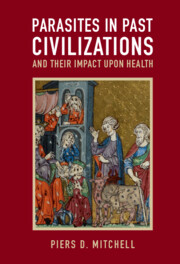Book contents
- Parasites in Past Civilizations and Their Impact upon Health
- Parasites in Past Civilizations and Their Impact upon Health
- Copyright page
- Contents
- Acknowledgements
- 1 Introduction
- 2 Near Eastern Civilizations
- 3 Ancient Egypt and Nubia
- 4 The Prehistoric Peoples of Europe
- 5 The Roman World
- 6 Medieval Europe
- 7 East Asian Civilizations
- 8 North American Indigenous Peoples
- 9 South and Central American Civilizations
- 10 Parasites, Migrations, and Epidemics
- 11 Conclusion
- Bibliography
- Index
2 - Near Eastern Civilizations
Published online by Cambridge University Press: 30 March 2023
- Parasites in Past Civilizations and Their Impact upon Health
- Parasites in Past Civilizations and Their Impact upon Health
- Copyright page
- Contents
- Acknowledgements
- 1 Introduction
- 2 Near Eastern Civilizations
- 3 Ancient Egypt and Nubia
- 4 The Prehistoric Peoples of Europe
- 5 The Roman World
- 6 Medieval Europe
- 7 East Asian Civilizations
- 8 North American Indigenous Peoples
- 9 South and Central American Civilizations
- 10 Parasites, Migrations, and Epidemics
- 11 Conclusion
- Bibliography
- Index
Summary
In the ancient Near East the most successful intestinal parasites were whipworm, roundworm, Taenia tapeworm, and pinworm. While roundworm and whipworm are commonly found in early agricultural societies, the repeated presence of Taenia tapeworm in Near Eastern populations over time suggests that it was particularly suited to the climate and diet of the region. The presence of schistosomiasis at Tell Zeidan during the Chalcolithic period appears to be the earliest evidence so far identified for the invention of a new technology by humans increasing the risk of spread of an infectious disease. Agricultural irrigation was first developed in the Near East around 7500 BCE, and these irrigation systems allow breeding of the water snails that can spread the schistosomiasis when people wade through areas of standing freshwater. Head lice and body lice were also present in the region, and head lice in particular seem to have been present from the earliest prehistoric populations there. The development of wooden delousing combs, coupled with the arid climate that preserved them, has resulted in a strong body of evidence for head lice and their eggs.
- Type
- Chapter
- Information
- Publisher: Cambridge University PressPrint publication year: 2023



